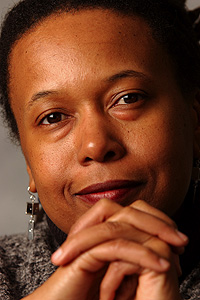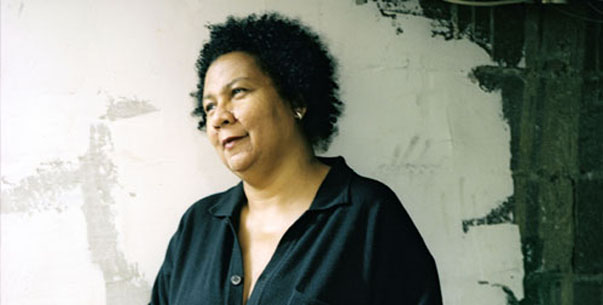January 7th, 2013 by Ajuan Mance

Professor Stephane Dunn
(Source: Cinema, Television, and Emerging Media Studies, Morehouse College)
***
It is not enough that Django is allowed to get “dirty” in order to rescue his lady. Django has more responsibility because his is an epic situation and there are other slaves, indeed a whole system of slavery. Quite frankly, Django needs to do more than get payback on ‘Monsieur Candie and his cohorts. He also needs to care about the other slaves and whether others are left behind and function as a call to revolution. Whether he can save or free them all is beside the point. He has to care and he has to try or what’s the point of a fertile, creative mind like Tarantino that thrives on the fantastical? How could he fail to strike a blow at the system itself and dare to show Django exercise more compassion for a white boy witnessing his killer father get murdered than he does another branded, humiliated black man get torn by blood hounds?
–Stephane Dunn in “Django: A Baadassss Film for the Ages?”
***
Biographical Notes: Stephane Dunn is Assistant Professor of English and the Co-Directory of Cinema, Television, and Emerging Media Studies at Morehouse College in Atlanta, Georgia. She holds a B.A. from the University of Evansville and she earned an M.A. in English, an M.F.A. in Creative Writing, and a Ph.D. in English from the University of Notre Dame. She is the author of Baad Bitches & Sassy Supermamas: Black Power Action Films (U of Illinois Press, 2008). Her articles and essays have appeared in Ms. magazine, Screening Noir, The Chronicle of Higher Education, TheRoot.com, AJC, CNN.com, the Best African American Essays(2009), and other periodicals and collections.
Posted in Uncategorized | Comments Off on The Quotable Black Scholar: Stephane Dunn on *Django Unchained* (Spoiler Alert)
August 6th, 2012 by Ajuan Mance

Benjamin Griffith Brawley (1882-1939)
Benjamin Griffith Brawley was born in Columbia, South Carolina to parents Margaret Dickerson Brawley and Edward McKnight Brawley, the president of a small Alabama college. As a young man Brawley’s father had been the first African American student to graduate from Pennsylvania’s Bucknell University. Academically precocious, the young Benjamin was tutored at home by his mother for several years before enrolling in and attending schools in several states. A gifted student of classical languages, he divided his summer days between odd jobs in the agricultural sector and studying Latin and Greek on his own. At the age of 13, he enrolled in the preparatory program at Altlanta Baptist College (now Morehouse University). Brawley would go on to earn baccalaureate degrees from Morehouse (1901) and the University of Chicago (1906), as well as a master’s degree from Harvard University (1908). He held teaching posts at Howard University, Shaw University, and Morehouse, where he was appointed the institution’s first dean. A prolific writer of both poetry and scholarship, Brawley published a number of poems in the period’s Black magazines and newspapers. His books include three collections of poetry and numerous volumes on African American literature and history, most notably, A Short History of the American Negro (1913), The Negro in Literature and Art in the United States (1918), A Short History of the English Drama (1921), and Paul Laurence Dunbar: Poet of His People (1936).
Posted by Ajuan Mance
Posted in Uncategorized | Comments Off on Black Pioneers in High Education: Benjamin Griffith Brawley (1882-1939)
June 18th, 2012 by Ajuan Mance

This resource center is needed to address this homophobia on campus and to work to make the environment safe for all of the students and all the faculty, staff and pretty much anybody even in the Bowie community that’s seeking some kind of a resource or some kind of help.
—Professor Adrian Krishnaswamy (above), faculty director of the LGBTQIA Resource Center, interviewed by NPR’s Michelle Martin, June 14, 2012, with Bowie State alumna Melanie Carr
***
On June 14, 2012, Michelle Martin, host of NPR’s Tell Me More, interviewed Bowie State communications professor Adrian Krishnasamy and recent alumna Melanie Carr about their university’s recent decision to open a Lesbian, Gay, Bisexual, Transgender, Queer (LGBTQ) student center.
The first historically Black college or University (HCBU) to establish this type of resource, the Maryland-based university has received accolades from human rights organizations across the country, as well as interest from both local and national news outlets.
The listen to the entire interview, or to read the transcript, follow THIS LINK.
Posted by Ajuan Mance
Posted in Uncategorized | Comments Off on New LGBT Center at Bowie State U a First for HBCUs
May 29th, 2012 by Ajuan Mance

The Notable Black College Grads page is a work in progress. For the full list of distinguished alumni of African descent from colleges beginning with the letters A though H, following THIS LINK.
Posted by Ajuan Mance
Posted in Uncategorized | Comments Off on Notable Black College Grads
May 28th, 2012 by Ajuan Mance

It is with great sadness that I must report the recent death of Lt. Cmdr. Wesley A. Brown, the first African American to graduate from the U.S. Naval Academy. He died on Tuesday, May 22, 2012. The cause of death was cancer. I first blogged on Lt. Cmdr. Brown in 2008. In a post titled “Black Firsts, May 2008: Lt. Cmdr. Wesley A. Brown” I described the Academy’s planned dedication of the Wesley Brown Fieldhouse, a $52 million, 140,000 square foot sports complex named for the pioneering Black midshipman. Follow this link to the read the New York Times obituary for Lt. Cmdr. Brown: “Wesley Brown, Pioneer as Black Naval Graduate, Dies at 85.”
May he rest in peace.
Posted by Ajuan Mance
Posted in African American Students, African Americans, Black History, Black Students, Current Events, Higher Education, race | Comments Off on In Memoriam: Lt. Cmdr. Wesley A. Brown
March 29th, 2012 by Ajuan Mance
Posted in Uncategorized | Comments Off on A Timeline of the Arctic Disaster
February 27th, 2012 by Ajuan Mance

Melissa Harris-Perry (b. 1973)
(Source: Indiewire.com)
***
I vigorously object to the oft-repeated sentiment that African-Americans should avoid public disagreements and settle matters internally to present a united front. It’s clear from the history of black organizing that this strategy is particularly disempowering for black women, black youth, black gay men and lesbians, and others who have fewer internal community resources to ensure that their concerns are represented in a broader racial agenda. Failing to air the dirty laundry has historically meant that these groups are left washing it with their own hands.
–Melissa Harris-Perry, in the essay “Breaking News: Not All Black Intellectuals Think Alike,” published in The Nation
Biographical Notes: Melissa Harris-Perry is a professor of political science at Tulane University, where she is founding director of the Anna Julia Cooper Project on Gender, Race, and Politics in the South. Professor Harris-Perry earned her B.A. at Wake Forest University and a Ph.D. in political science at Duke University. A political commentator, she appears regularly on MSNBC and she has a regular opinion column that appears in The Nation.
Posted by Ajuan Mance
Posted in Uncategorized | Comments Off on The Quotable Black Scholar: Melissa Harris-Perry on Airing Dirty Laundry
February 27th, 2012 by Ajuan Mance

Cathy Cohen (b. 1962)
(Source: The University of Chicago Chronicle)
***
[W]hen we include black youth as full and equal members of our political community, it means that we acknowledge their worth and will debate and pursue politics that reflects their priorities and needs.
–Cathy Cohen, interviewed by Henry Jenkins for Confessions of an Aca Fan: The Official Weblog of Henry Jenkins
Biographical Notes: Cathy J. Cohen is the David and Mary Winton Green Professor of Political Science. She is the author of two books, Democracy Remixed: Black Youth and the Future of American Politics (Oxford University Press 2010) and The Boundaries of Blackness: AIDS and the Breakdown of Black Politics (University of Chicago Press 1999), and many articles. She earned her B.A. at Miami University and her Ph.D. in political science at the University of Michigan.
Posted by Ajuan Mance
Posted in Uncategorized | Comments Off on The Quotable Black Scholar: Cathy Cohen on Black Youth and Political Participation
February 23rd, 2012 by Ajuan Mance

Bell Hooks (b. 1952)
(Source: AscentMagazine.com)
***
When we allow ourselves to experience the sensual pleasures of various black hair textures (especially in its natural state), we unlearn some of the negative socialization we are bombarded with about black hair.
–bell hooks in Sisters of the Yam
Biographical Notes: Activist and cultural critic bell hooks (born Gloria Watkins) has held positions at Yale University, Oberlin College, and the City University of New York. She is the author of 30 books. The Hopkinsville, Kentucky native earned a bachelor’s degree at Stanford University, an M.A. in English from the University of Wisconsin-Madison, and a Ph.D. from the University of California, Santa Cruz.
Posted by Ajuan Mance
Posted in Uncategorized | Comments Off on The Quotable Black Scholar: bell hooks on the Pleasures of Natural Hair
February 23rd, 2012 by Ajuan Mance

(Source: TheCotillionOnline.Com)
Posted by Ajuan Mance
Posted in Uncategorized | 1 Comment »








